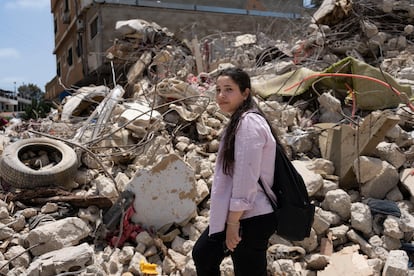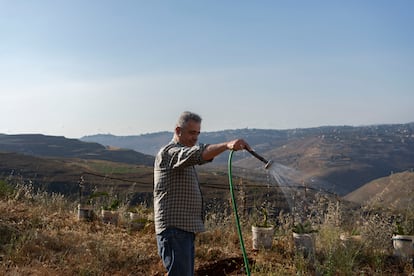The impossible duel in southern Lebanon: "People don't believe the war with Israel is over."


It's only been a few days since the rubble began to be removed from what had been Aya and her family's home for a decade. "I walked in here dressed as a bride, graduated, and gave birth to my two children. Seeing the bulldozer now is like they're destroying my house again, this time right in front of my eyes," says this woman, who prefers not to give her last name, in the living room of an apartment she rents in the city of Tyre, in southern Lebanon . On a table, she piles the chipped objects she was able to salvage from the concrete of the broken walls: an ultrasound, photos, notes on which she wrote reminders, and some dolls. "We've bought new ones, but the children still want to play with the old ones," she smiles.
The war in Lebanon pitted the Shiite militia-party Hezbollah against Israel in a conflict parallel to that in Gaza , forcing the displacement of more than a million people and the deaths of 4,000. The hardest hit areas were those with the greatest support for the militia, especially the south, and despite Israel's withdrawal of troops from the border towns it invaded, it still maintains up to five observation points inside Lebanese territory (and attacks continue to occur almost daily). Six months after the ceasefire came into effect, the south of the country is rebuilding, nursing the wounds of trauma and loss in a border region that knows little of peace.
Aya had to run when the bombs surrounded her home. She found refuge in a mosque in Sidon, about 40 kilometers south of Beirut, and returned with her family as soon as the truce was announced to find their building in ruins. “Israel came to our house and went ‘ boom boom, ’” Aya was surprised by the words of her son Yussuf, barely three years old. Her eldest, Ali, eight, is still scared of loud noises, fears the explosions will return, and his school grades have dropped dramatically. “We are living in a dream. We had everything, we left here, and when we came back, there was nothing,” she tells her mother, who regrets not having been able to protect her children from what she herself experienced as a child during the 2006 war between the same factions.
Lebanon is a country accustomed to cycles of conflict: from the 15-year civil war that ended in 1990 to the clashes between Israel and Hezbollah. The psychological scars are passed down from generation to generation, forming part of a collective memory accustomed to dealing with the effects of post-traumatic stress, depression, and anxiety.
With hardly any resources, people are rebuilding. This time slowly, because they don't believe the war is over.
Ramzi Najdi, farmer
Religion and community ties create an important support network for processing the death of family members and material loss, but therapy remains uncommon in Lebanon, explains psychoanalytic researcher Jessica Talhame. “The risk of repressing emotions is that they become stored in our bodies and emerge in the form of stomach problems, diabetes…” the expert continues. Adding to the war are the social and political crises that have ravaged Lebanon since 2019, which has recently led to the country being ranked as one of the “angriest” in the world. Two-thirds of its population is diagnosed with some type of mental disorder, and a fifth with depression.
A home and olive grovesThe entrance to Tyre, deserted during the months of September and November 2023 due to the escalating war, is once again populated by stands of bananas, watermelons, and avocados growing in fields stretching to the sea. Inside the attacked buildings, abundant in many villages, crews are rebuilding roofs and building new structures. Along the border line, however, the destruction wrought by the war is still very much present. In villages like Khiam and Kfar Kila, houses were detonated, the asphalt lifted by tanks, and olive groves uprooted and burned during the months the Israeli army occupied the area. Here, the cleanup work has barely been able to begin due to the threat of further attacks.
“With hardly any resources, people are rebuilding. This time slowly, because they don't believe the war is over ,” says Ramzi Najdi, a 67-year-old farmer, as the drone of an Israeli drone can be heard over Srifa, 20 kilometers from the border with the neighboring country. Despite the truce in force between the two countries since November, under the framework of United Nations Resolution 1701, attacks continue on a near-daily basis, particularly in the form of assassinations of members of Islamic groups in southern Lebanon. Missiles have also been launched against coastal fishermen and civilian infrastructure, such as booths for municipal elections, and in April the government published the figure of 190 dead and nearly 500 wounded since the official end of the war.

Last week, nearly a dozen bombs rocked the capital Beirut again, reviving the terror of war on the night before Eid al-Adha, the Feast of the Lamb, the most important festival in the Muslim calendar after Ramadan. “We usually buy new clothes, pack food, and suitcases and go to our villages in the south to reunite with the whole family. This year we can't do that either. If Israel chose to attack tonight, it's to scare us,” says 17-year-old Yussuf, as he takes shelter with his family and waits for the attacks to end on a hill near Dahiye, the southern region of the capital, considered a Hezbollah stronghold, which was bombed almost daily for months .
“We grew up with the idea that Israel was an invincible monster,” says Najdi, who can count the wars he has witnessed on his fingers. He was part of the secular resistance groups that fought against the Israeli occupation of southern Lebanon in the 1980s, which lasted until 2000. It was this habituation to conflict and tending to his citrus and olive groves that kept him in his home until the attacks left him without water or electricity. For him, it’s not about mental health or psychology, it’s about politics: “This is the first land where our Shiite ancestors were able to live in peace, just a few centuries ago. Even if they drop a nuclear bomb on us, we won’t leave.”
Beside him, his wife, Rabja Tauli, 65, fills the table with slices of watermelon, cucumbers, and balila , a Lebanese dish made with chickpeas or beans seasoned with cumin and lemon slices. “The two pillars of life in the south are our homes and the olive groves,” Tauli says. “Ramzi just planted 400 new trees a few days ago. Nothing will make us leave.”
EL PAÍS




